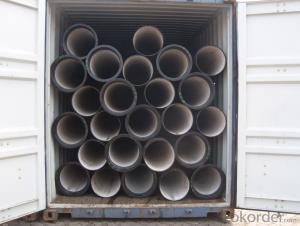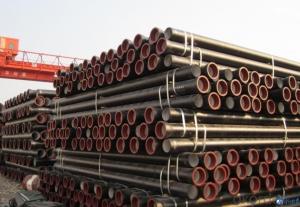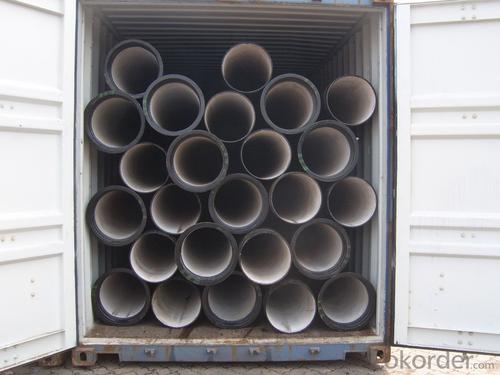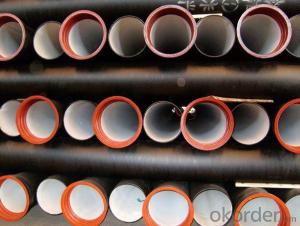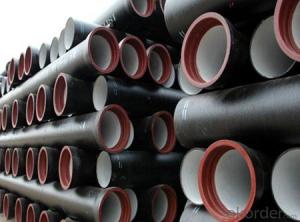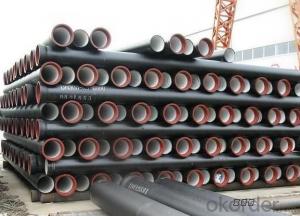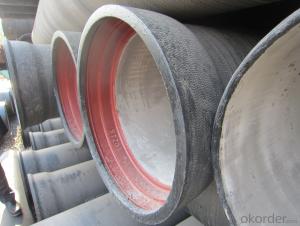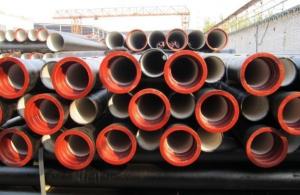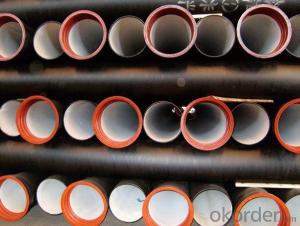Ductile Iron Pipe Professional Manufacturer On Sale DN500 EN545/EN598/ISO2531
- Loading Port:
- China main port
- Payment Terms:
- TT or LC
- Min Order Qty:
- 25 m.t.
- Supply Capability:
- 200000 m.t./month
OKorder Service Pledge
OKorder Financial Service
You Might Also Like
1,Ductile Iron Pipe Description :
DI pipe fittings are manufactured according to ISO 2531 or BS EN545 or BS4772 FOR POTABLE WATER ,internal is cement lining or wet epoxy coating;External is zinc plus bitumen or wet epoxy coating. We also manufacture ductile iron fittings with fusion bonded epoxy both inside and outside. All the producets are sutible to water pipes fields.We have passed ISO9001,ISO14001,OHSMS18001 certificate.
2,Main Features of the Ductile Iron Pipe:
1).Quality guarantee
• Chemical checking
• NDE after rough machining
• Mechanical testing after heat treatment
• Final NDE,dimension inspected
2).Quality document
• Full Q.A document as per client request
3).Packing and Shipping
• standard export package(carton/wooden case/pallet)
• accept FOB,FAS,CNF,CIF door to door etc or customer designated shipping agent
4).Service
• Drawing: we can translate your original drawing, offer best suggestion on design
• Quality: we have full set quality control system to guarantee the best quality.
• Inspection: inspect in house, all our products must be checked 3 times before packing
3,Ductile Iron Pipe Images:
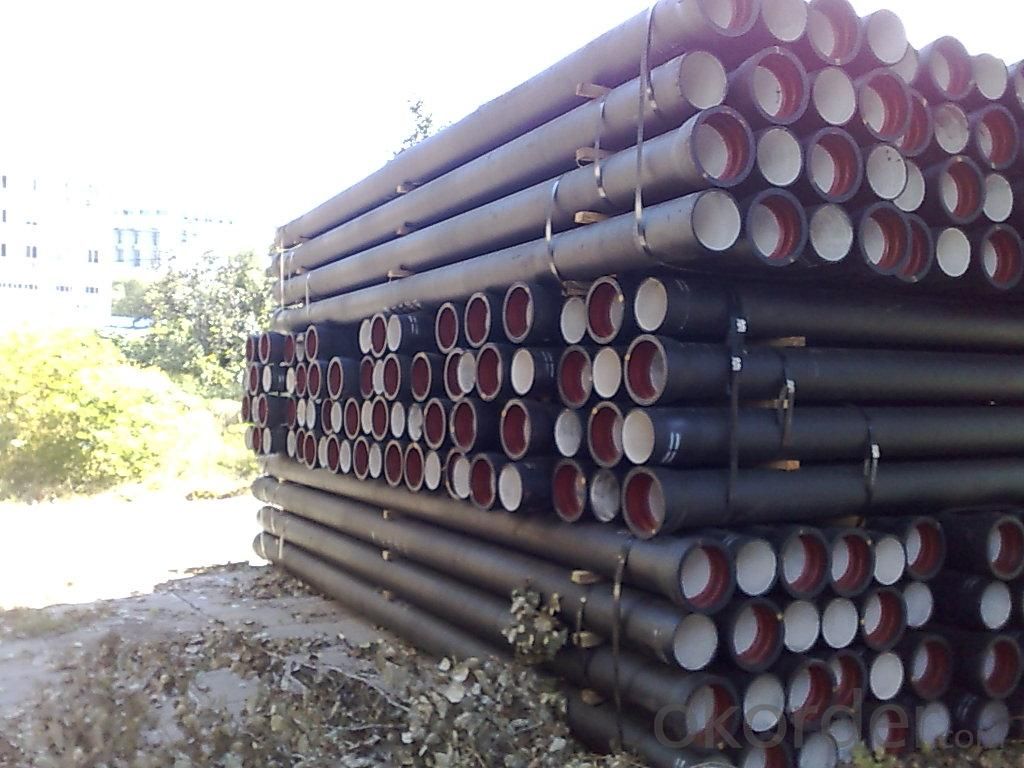
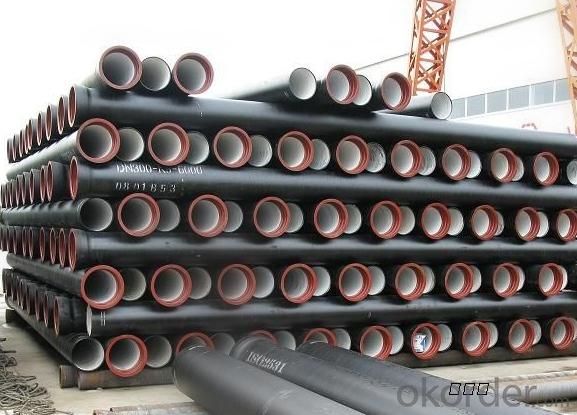
4. Ductile Iron Pipe Specification:
Internal lining: ductile iron pipes shall have an internal cement mortar lining in acc with ISO4179.
External coating: ductile iron pipes shall be externally coated with metallic zinc spray plus a further layer of resin
painting to ISO8179.
Gasket: 100% SBR/NBR/EPDM rubber gasket in accordance with ISO4633.
Packing: ductile iron pipes from DN100 to DN300 be bundled with steel belts, others are in bulk.
Payment term: L/C, T/T.
5.FAQ:
We have organized several common questions for our clients,may help you sincerely:
1.Q: Why would you choose ductile iron pipe rather than other pipe materials?
A:The reasons are obvious for that not only ductile iron pipe possesses the inherent strength and flexibility of ductile iron, combined with proven corrosion protection systems, but also the cost savings can be achieved from design to installation and commissioning.
2.Q:Why can you guarantee the inner of pipes can’t be corroded?
A: High alumina cement mortar lining and sulphate-resistant cement mortar lining. These two special linings are applicable to inner anti-corrosion for sewage pipes, improving resistance to erosion of the sewage components.
- Q: What is the composition of ductile iron pipes?
- Ductile iron pipes are primarily composed of iron, along with small amounts of carbon, silicon, and other alloying elements. The iron content typically ranges from 90% to 94%, while carbon content is usually around 3% to 4%. Silicon is added in the range of 1.5% to 3%, which helps enhance the ductility and strength of the iron. Other alloying elements such as manganese, sulfur, and phosphorus may also be present in smaller quantities. The composition of ductile iron pipes is carefully engineered to achieve specific properties. The addition of carbon and silicon improves the hardness and strength of the iron, making it more suitable for demanding applications. The presence of these alloying elements also contributes to the ductility of the pipes, allowing them to be easily bent and molded without breaking. Overall, the composition of ductile iron pipes is designed to provide a balance between strength, ductility, and resistance to corrosion. This makes them ideal for use in water and sewage systems, where they can withstand high pressure, handle heavy loads, and resist the corrosive effects of water and other chemicals.
- Q: How do ductile iron pipes handle soil movement?
- Ductile iron pipes are known for their excellent strength and durability, making them highly capable of handling soil movement. These pipes are designed to resist external loads and pressures caused by soil settlement, ground shifting, or other environmental factors. One of the key features of ductile iron pipes is their flexibility. Unlike rigid materials such as cast iron or concrete pipes, ductile iron pipes have a certain level of elasticity that allows them to withstand soil movement without cracking or breaking. This flexibility enables the pipes to absorb the stresses induced by the soil, preventing any significant damage to the pipeline system. Furthermore, ductile iron pipes possess high tensile strength, which means they can resist pulling forces resulting from soil movement. The pipes can withstand the expansion and contraction of the surrounding soil, reducing the risk of pipe deformation or failure. Moreover, ductile iron pipes are often installed with proper bedding and backfilling techniques to further enhance their ability to handle soil movement. Adequate bedding materials, such as crushed stone or sand, are used to provide stable support to the pipes and distribute the external loads evenly. This helps to minimize the impact of soil movement on the pipes and maintain their structural integrity. In summary, ductile iron pipes are designed to effectively handle soil movement due to their flexibility, high tensile strength, and proper installation methods. These pipes can withstand the stresses induced by soil settlement, ground shifting, or other soil-related factors, ensuring reliable and long-lasting performance in various environmental conditions.
- Q: How much water seepage is allowed in the water pressure test for water hose DN300?
- For water polo hose DN300, hydraulic pressure test allows water penetration to be 17.60 m3 / (24h km).The water pressure test of the indoor water supply pipeline must meet the design requirements. When the design is not specified, the test pressure of all kinds of material supply piping system is 1.5 times of the work pressure, but not less than 0.6MPa.
- Q: Is ductile iron pipe breakable?
- 1 、 the drainage pipe is easy to fold. Folding is formed on the surface of various drainage pipe line, the longitudinal defects often throughout the entire product;2, poor drainage pipe surface prone to scarring;3, inferior drainage pipe, no metallic luster, is pale red or similar to the color of pig iron;4, inferior drainage pipe easily scratch, because the inferior material manufacturers equipment is simple, easy to produce burr, scratches the drainage pipe surface. Deep scrape reduces the strength of the ball drain;
- Q: How does ductile iron pipe perform in corrosive environments?
- Ductile iron pipe is well-known for its exceptional performance in corrosive environments. It has proven to be highly resistant to corrosion due to its unique composition and protective coatings. The primary factor contributing to its resistance is the presence of graphite nodules, which act as a barrier against corrosive agents. These nodules effectively inhibit the spread of corrosion and provide a protective layer for the iron pipe. Additionally, ductile iron pipes often undergo several external coatings and linings to further enhance their resistance to corrosion. These coatings, such as cement mortar lining or epoxy coatings, provide an additional layer of protection against corrosive substances. They create a barrier between the pipe and the surrounding environment, preventing the corrosive agents from reaching the iron surface. Furthermore, ductile iron pipes are highly durable, which adds to their performance in corrosive environments. They have a long life expectancy and can withstand high-pressure conditions, making them suitable for various applications. The inherent strength of ductile iron makes it less susceptible to damage, even in harsh environments. It is important to note that while ductile iron pipes exhibit excellent resistance to corrosion, the specific performance can vary depending on the nature and concentration of the corrosive substances present. In extremely aggressive environments, additional protective measures such as cathodic protection or sacrificial anodes may be required to ensure long-term durability. Overall, ductile iron pipe has a proven track record of performing exceptionally well in corrosive environments. Its unique composition, combined with external coatings and linings, make it a reliable choice for applications where corrosion resistance is crucial.
- Q: Are ductile iron pipes resistant to abrasion or wear?
- Indeed, ductile iron pipes exhibit remarkable resistance against abrasion and wear. Renowned as cast iron as well, ductile iron represents a robust and enduring substance exclusively crafted to endure abrasive circumstances. Ductile iron's distinct microstructure grants superb resistance to abrasion, rendering it an optimal selection for scenarios wherein pipelines face extensive levels of wear. Furthermore, the extended lifespan of ductile iron pipes showcases their enduring capacity against abrasion and wear throughout time.
- Q: What is the cost of ductile iron pipe compared to other pipe materials?
- The cost of ductile iron pipe can vary depending on factors such as size, length, and project requirements. Generally, ductile iron pipe tends to be more expensive than alternatives like PVC or HDPE pipes. Ductile iron pipe is renowned for its strength and durability, making it suitable for water distribution, wastewater systems, and industrial piping. Its robustness and longevity contribute to its higher cost compared to other materials. In contrast, PVC and HDPE pipes are often more affordable due to lower production and material costs. They are also lightweight, easy to install, and resistant to corrosion, resulting in cost savings during installation and maintenance. While ductile iron pipe may have a higher upfront cost, its superior strength and longevity can lead to long-term savings by reducing the need for frequent repairs or replacements. The choice of pipe material should consider project requirements, budget constraints, and the expected lifespan of the infrastructure.
- Q: What are the different sizes available for ductile iron pipes?
- Ductile iron pipes, also known as DI pipes, are available in a wide range of sizes to suit various applications and requirements. The sizes of ductile iron pipes typically range from DN 80 (3 inches) to DN 2600 (104 inches) in diameter, with various wall thicknesses. For smaller diameters, such as DN 80 to DN 300, ductile iron pipes are commonly available in standard lengths of 5.5 meters or 6 meters. As the diameter increases, the standard lengths may also increase, reaching up to 7 meters or even longer for larger sizes. The commonly used sizes of ductile iron pipes include DN 80, DN 100, DN 150, DN 200, DN 250, DN 300, DN 350, DN 400, DN 450, DN 500, DN 600, DN 700, DN 800, DN 900, DN 1000, DN 1200, DN 1400, DN 1600, DN 1800, DN 2000, DN 2200, DN 2400, DN 2600, and many more. It is important to note that the availability of different sizes may vary depending on the manufacturer and the specific region or country. Additionally, custom sizes can also be manufactured to meet specific project requirements. When selecting the appropriate size of ductile iron pipes, it is crucial to consider factors such as the flow rate, pressure, and intended application to ensure optimal performance and durability. Consulting with industry professionals or referring to relevant standards and guidelines can help in determining the appropriate size for a specific project.
- Q: Can ductile iron pipe be used for marine applications?
- Ductile iron pipe is suitable for marine applications due to its high strength, durability, and resistance to corrosion. This type of cast iron possesses properties that make it ideal for use in various marine environments, including those with saltwater. Marine applications commonly utilize ductile iron pipes for tasks such as seawater intake and outfall systems, offshore oil and gas platforms, submarine pipelines, and marine dredging projects. The corrosion-resistant nature of ductile iron protects against the harsh conditions found in marine environments, including corrosive saltwater, tidal currents, and marine organisms. Furthermore, ductile iron pipes have excellent mechanical properties, including high tensile strength and impact resistance, which further enhance their suitability for marine applications. In conclusion, ductile iron pipe is a reliable and cost-effective choice for a wide range of marine applications.
- Q: Can ductile iron pipes be used for underground cooling water systems?
- Yes, ductile iron pipes can be used for underground cooling water systems. Ductile iron pipes are known for their durability, high strength, and resistance to corrosion, making them suitable for various applications, including underground installations. In cooling water systems, where the pipes are exposed to water and potentially harsh environments, ductile iron pipes provide a reliable and long-lasting solution. Their ability to withstand high pressure and temperature fluctuations further ensures the efficient and safe operation of the cooling water system. Additionally, ductile iron pipes are often preferred for underground installations due to their ease of installation, low maintenance requirements, and cost-effectiveness.
Send your message to us
Ductile Iron Pipe Professional Manufacturer On Sale DN500 EN545/EN598/ISO2531
- Loading Port:
- China main port
- Payment Terms:
- TT or LC
- Min Order Qty:
- 25 m.t.
- Supply Capability:
- 200000 m.t./month
OKorder Service Pledge
OKorder Financial Service
Similar products
Hot products
Hot Searches
Related keywords
